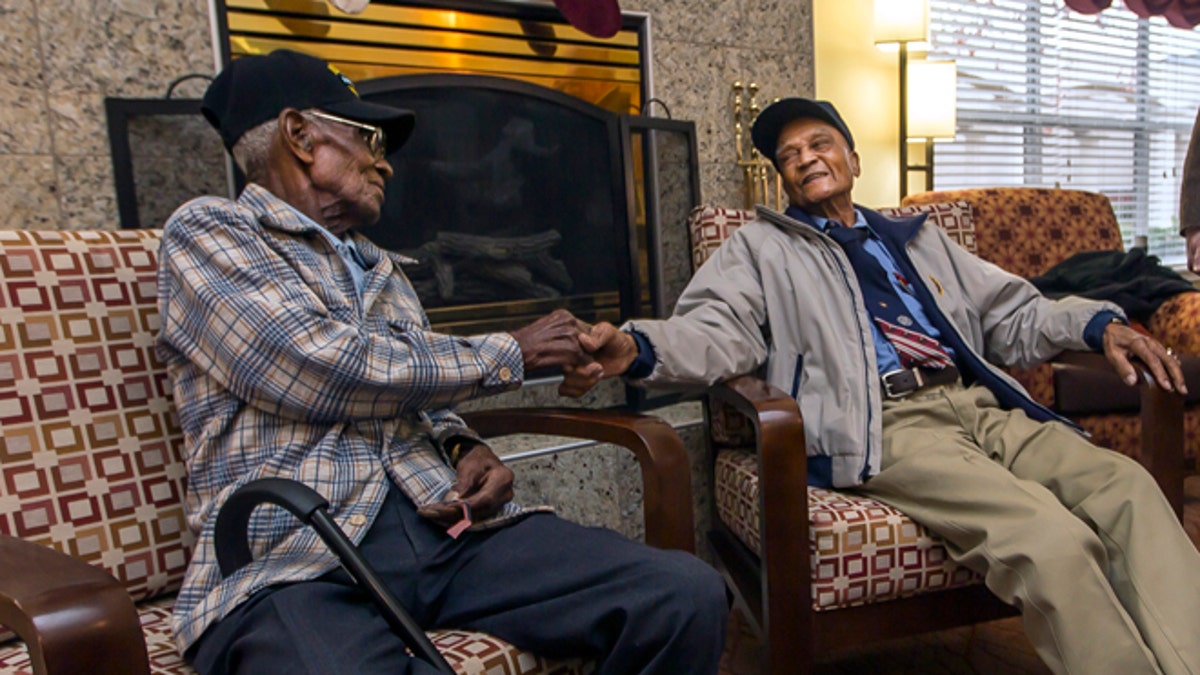
Dec. 13, 2013: Richard Overton, 107, left, and Elmer Hill, 107, center, shake hands before Austin Texas Mayor Lee Leffingwell, right, presents a proclamation acknowledging and thanking Overton, and Hill for their service. (AP/Austin American-Statesman)
AUSTIN, Texas – At age 107, World War II veteran Elmer Hill doesn't have many elders left. That's why meeting a fellow veteran and Texan who's three months his senior was a bit of a shock Friday.
Upon seeing Richard Overton for the first time, Hill suggested he might have to change his birthday. "He's 107? Well, I better move mine up a little bit!" Hill exclaimed.
The pair, who both fought in the war's Pacific theater, met at an Austin senior center where they shook hands warmly, had lunch and were honored by Mayor Lee Leffingwell. Some have said that Overton and Hill are the oldest and second-oldest living veterans in the U.S., but others dispute the claim and there is no way to fully verify who is right.
Overton worked at a furniture store and is a former courier at the state Capitol who grew up in Austin, where he still lives. Hill, a retired high school principal, lives in the East Texas community of Henderson and was driven about 240 miles for the event, which was organized by Emeritus Senior Living.
The U.S. Department of Veterans Affairs does not have a complete list of all Americans who have served in the armed forces, making it impossible to know for sure that Overton and Hill are the nation's oldest veterans. Still, Overton went to Washington for Veterans Day this year and was personally recognized by President Barack Obama.
Hill, meanwhile, is set to visit Washington on Saturday.
His mind sharp and his wit quick, Overton quips about smoking cigars and having an occasional drink. As he stood outside the center amid chilly rain waiting for Hill's car, he joked that he hoped his new friend was bringing whiskey.
Both are black, and during lunch, Hill talked about being drafted in 1942 into the then-segregated armed forces, and serving in the Navy. He was a cook and gunner on an aircraft carrier.
"I didn't volunteer. They put me in there," he said. Asked later what advice he had for younger generations, Hill said: "Be good to yourself and your master and be a good citizen, wherever you are, whether it's Navy, Army or just as a person at the house."
He also joked, "I'm not that old. I've just been here a very long time."
Back then, blacks were assigned to all-black units and, at the start of World War II, they were often relegated to noncombat duties. As fighting continued, the heavy number of casualties forced the military to assign black troops to combat, and their numbers there spiked by 1945.
Overton was already in his 30s when he volunteered and served in the Army's 188th Aviation Engineer Battalion. He was at Pearl Harbor just after the Japanese attack.
"I want to ask him a few questions about the war," Overton said of Hill. "You're still fighting a war, you know. Now you're just fighting one with yourself."
With both hard of hearing, however, conversation on specific topics proved difficult.
Born May, 11, 1906, Overton recalled as a youngster seeing soldiers preparing for World War I. He said he was on a bridge and watched thousands of enlisted men arriving at Austin after walking 90-plus miles from San Antonio because there was no room for them on overcrowded trains.
Later, he found himself a soldier.
"Some things you went through in that Army you will never forget," he said. "But it's too much to tell. You can't tell it all."









































